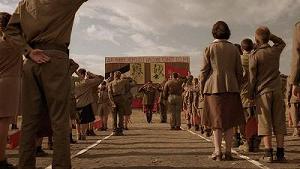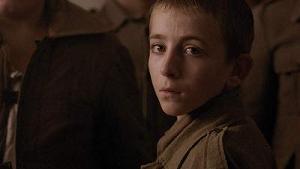

Films often reflect the political and sociological climate of the country it originates from. In the past few years, as Russian and its neighbors continue to democratize, a relative flood of movies with vastly different themes have made their way across the Atlantic. Recent examples include You I Love, The Return, and Schizo. The Great Water is the latest movie, this time from Macedonia (well, Yugoslavia). It is a pretty bleak look at post World War II childhood, and is based on the novel by Zivko Cingo.
The story centers on the childhood of Lem Nikodinoski (Saso Kekenovski). Nikodinoski finds himself thrown into an orphanage after the war. The orphanage is a pretty hellish place, ruthlessly brainwashing the children to worship Stalin like a God. Life is extremely difficult, until the appearance of Isaac (Maja Stankovska). Isaac has almost magical powers. He doesn't speak, and can calm down any situation. The instructors, who are usually belligerent towards the children, seem afraid of him. He can do pretty much what he wants, and Nikodinoski is drawn towards Isaac. Isaac stays pretty aloof,
There are obvious Biblical allusions in the character of Isaac and the actions of the adults in the orphanage. Director Ivo Trajkov (The Past, The Canary Connection), who adapted the story with Vladimir Blazevski (Gypsy Magic) create an oppressive, bleak atmosphere bereft of hope and pretty much everything else. The children do an impressive job. They are robots, aping the doctrine of their teachers, and missing the playfulness and wonder that children usually have. They are mini-fanatics. Kekenovski is creepy. His performance is hollow, and his character is grasping onto anything that will help him survive.
The Great Water falters by not really going anywhere. Much of the story is told in flashback fashion, where a sick and elderly Nikodinoski reminisces about his childhood. Obviously, his experience at the orphanage with Isaac marked an important part in his development, but much of the meaning is lost. All the viewer knows is that the adult Nikodinoski is a politician. Yes, things do happen at the end of the movie, but there is a feeling of "so what?" The Great Water also needs some context in order to make the film more meaningful. It takes place shortly before Tito broke ties with the Soviet Union. Because many Americans do not know this, and because Trajkov moves things a bit slowly and is a little obtuse, it feels like part of a story, and a pretentious one at that.